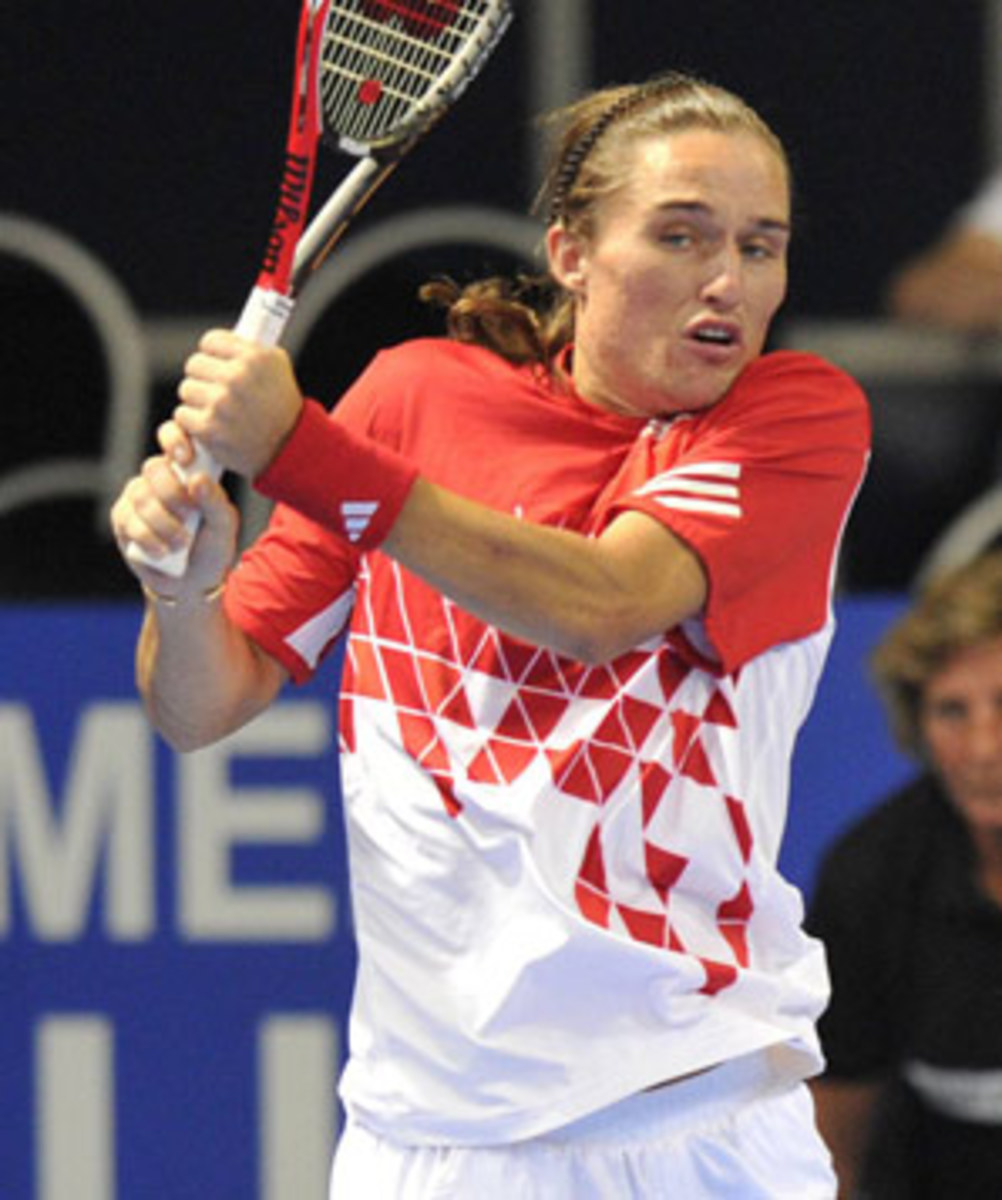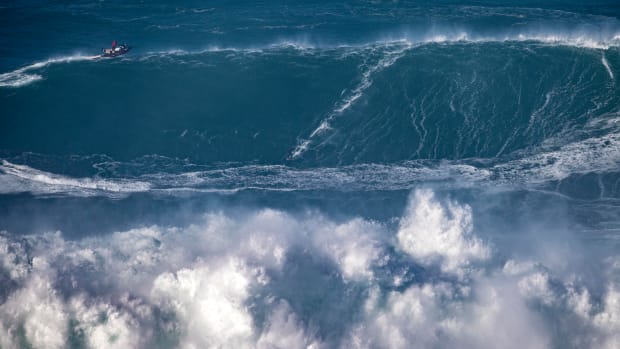
Alex Dolgopolov: Tortured genius
It must be getting late in the tennis season, for we speak today of a man named Alexandr Dolgopolov.
If you've seen him play, you're still with us. Seldom has the sport seen anything like the quiet genius of the Ukraine: innovator, shot-maker, seeker of the perfect match. So often, he falls terribly short. Just as often, he seems not to care. Certainly there's a fire within, but it's more of a simmer than a flame. The man seems quite content to blow everyone's mind with creative artistry, then take a bit of a mental holiday -- and however the match plays out, there's always next week.
As the calendar stretches into eternity, a preposterous two-month aftermath to the U.S. Open, there are little gems to be found. I was certain that one of last week's semifinals at the Moselle Open in France -- Dolgopolov vs. Jo-Wilfried Tsonga -- would be just such a treat. It's a fabulous matchup in any setting, two of the most gifted athletes on Tour, and as much as I enjoy Tsonga's boundless energy, I was hoping Dolgopolov could win this match, move on to the final (against Ivan Ljubicic) and score only the second Tour-level title of his career.
For many fans, the fascination with Dolgopolov began at the Australian Open, where he defeated Tsonga on an eye-catching path to the quarterfinals. We learned that his mother was a European champion gymnast, and that his father, Oleksandar, was a teaching pro who worked with Andrei Medvedev and other accomplished players. The kid picked up his first racket at the age of 3, spent ample time on the Tour and hit with many top pros throughout his childhood.
The family plan was to develop a player with classic, conventional strokes, but it proved to be a story of independence. In the fine tradition of Pancho Segura, Alberto Berasategui and Fabrice Santoro, tennis was about to unveil its latest true original, a player defined by the unconventional. As he began to draw notice, Dolgopolov officially changed the spelling of his first name to gain separation from his father's identity. And he found a kindred spirit in Australian coach Jack Reader, who spotted the kid's talent at 17 and eventually became his full-time coach.
"All I've done is encourage him and say, 'Don't doubt yourself,' " Reader told The Wall Street Journal earlier this year. "He's just hitting some crazy shots. You wouldn't try to teach this."
At 22, Dolgopolov is ranked 19th in the world -- and admired by opponents never quite sure what's coming next. While most players experiment occasionally (if ever) with a slice backhand, Dolgopolov has at least three versions of the shot. He'll hit normal-looking forehands, then suddenly unleash a searing winner with a distinctive, whip-like motion. Slice, flat, topspin, drop shots, lobs -- you're likely to see anything at any time, and when it comes to serving, he's the anti-Novak Djokovic. As the world No. 1 bounces the ball 20, even 30 times, Dolgopolov acts as if he's late for dinner, taking a couple of quick bounces before launching a low-toss, rapid-fire motion that can be devastatingly effective. (Note to Maria Sharapova and so many others on the women's Tour: You're kidding yourself with the sky-high toss. This guy is an athlete; you're a statue.)
Dolgopolov's Australian Open performance hinted at great things to come, for clay is his favorite surface. It didn't quite work out that way. He did score his first Tour victory in Croatia, defeating local favorite Marin Cilic in the final, but as the clay-court season progressed, he was beaten four straight times in the first round and took a disappointing third-round loss to Viktor Troicki at the French Open.
By this time, it was evident that Dolgopolov's strategic approach was no match for his talent. Perhaps because he grew up around the Tour, hitting with players two or three times his age, he's not at all awed or inspired by the big occasion. There's a marvelous freedom to his approach, but lacking that fierce passion to dominate. "Don't miss watching him, if you get the chance," said one noted coach during the U.S. Open, "but he'll probably let you down in the end." And so it was at Flushing Meadows, Dolgopolov engaging Djokovic in a sensational, 16-14 tiebreaker but also losing in three sets and appearing downright passive at the finish.
Switch now to the French town of Metz, where last week's tournament unfolded, and a crowd buzzing with anticipation over the Dolgopolov-Tsonga semifinal on an indoor hardcourt. The Ukrainian broke serve for a 2-1 lead in the first set with a wondrous forehand winner down the line. Serving at 3-2 and 30-15, he looked to be in total command -- until he inexplicably tried a forehand drop shot from behind the baseline. "He gets a bit carried away," British announcer Guy McCrea said on the Tennis Channel broadcast as the ball sank into the net.
Later in that game, up against a break point, Dolgopolov charged the net behind his second serve -- a spectacularly bad idea against almost any top player these days. Tsonga accepted the gift, ripped a backhand passing shot, and the mood had undeniably changed. Serving to stay in the set at 4-5, Dolgopolov's response to a set point was to attempt another drop shot, this one a backhand slice from just inside the baseline, off Tsonga's service return. "Oh, he gets it all wrong," McCrea muttered as the shot fell short.
By now, it seemed a foregone conclusion that Tsonga would be dancing joyfully around the court, to the delight of his home-country audience, after a stirring victory (6-4, 6-4). The match had been great fun, and perhaps quite predictable in the end. In tennis, as in life, the genius walks alone.
• For those outraged by the minimal fine ($2,000) assessed to Serena Williams for her verbal assault on chair umpire Eva Asderaki during the U.S. Open, here's an explanation from The Washington Post's John Feinstein, author of Hard Courts, among numerous other sports books: "If Serena had been fined $10,000 or more, it would have been considered a 'major offense.' Under the terms of probation she was still on -- from her profanity/threat-filled outburst in the 2009 semifinals -- if she had committed a 'major offense,' she could have been suspended for next year's Open by the Grand Slam Committee. Obviously, losing Williams would have hurt corporate sales and, perhaps most important, wouldn't have made the all-important TV partners happy, either."
• Serena has taken plenty of heat, and rightly so, for her dismissive remarks and insincere apologies regarding those temper tantrums. Upon arriving at this year's Open, she was ridiculously coy ("You mean the singles or doubles?") when asked about the 2009 incident. It should be noted, though, that Serena did show some remorse. She expressed it only once, as far as I can tell, but this is what she told USA Today's Doug Robson, a journalist she trusts, during the summer: "I became unplugged. What I did was totally uncalled-for and unnecessary and, you know, bratty and whatever. I apologized. But I told her I needed an apology, too. I don't think anyone should call a foot fault in the semifinals of a Grand Slam at that point, especially because I don't foot-fault. I'm never going to cheat or be unsportsmanlike. I'm going to beat you straight, fair, in your face."
• There's a pretty cool event going on this week in Tokyo. The Pan Pacific Open has drawn a superb field -- Maria Sharapova, Caroline Wozniacki, Victoria Azarenka, Marion Bartoli, Samantha Stosur (a first-round casualty), Ana Ivanovic and Petra Kvitova, among others -- partly due to the spirit of revival in a country devastated by the March 11 earthquake and tsunami. "The commitment the players have shown is incredible," Sharapova said. "With nearly a full draw, I think the players have shown their dedication." Given that Serena needs to get back on the public-relations trail, showing the very best of her game and persona, shouldn't she be there?
In the midst of earnest dialogue about the ATP schedule and players' complaints, Andy Murray threw up a real stinker, saying that if the U.S. Open ever adds an additional day (thus beginning on a Sunday), "They'd better increase the prize money substantially, because it's an extra day's work for us."
First of all, no, it isn't. It's not as if you suddenly have to win eight matches to win the title. And an extra day would be a step in the right direction toward a more relaxed, sensible schedule. You're going to need a second serve on this one, Andy. The first one was called out.





